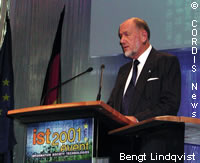Improving quality of life with IST
Society was a principal focus at this year's IST (information society technologies) conference in Düsseldorf, entitled 'Technologies serving people'. The conference analysed how IST could help society and how to ensure the inclusiveness of these benefits. Convinced that the digital divide can be closed, Enterprise and Information Society Commissioner Erkki Liikanen told CORDIS News that the EU's Member States need to do more in this area. 'Not enough has been done,' said Mr Liikanen. 'A key issue is to connect schools to the Internet and to upgrade curricula.' The Commissioner explained that school curricula should be modified so that IT need not be taught as a separate subject, but is instead an intrinsic part of all subjects. 'Employers and public institutions also have responsibility,' said Mr Liikanen. They need to 'put content there so that it makes sense for the citizens,' he said. If adequate content is available, citizens will prefer to 'work online rather than stand in line,' Mr Liikanen told CORDIS News. He added however that a lot of the necessary action cannot be done at Member State level, and that regulation is needed. 'We need a legal framework to create competition, and if the public sector is required for support, for example in remote regions, then it has a role to play,' said Mr Liikanen. A call for an inclusive information society also came from Wolfgang Clement, the Minister President of the German 'Land' Nordrhein Westfalia. 'What good is the best technology when I don't have access to it, when it scares me, or when my knowledge and abilities are not sufficient to tap into its potential?' said Mr Clement at the opening of the conference. 'No modern political economy can allow that a large part of its population can't use modern communication technologies or has not opportunity to do so,' he said. 'We should ask ourselves critically why it is that more and more people are having difficulties using a PC or the Internet. We should not and cannot simply wait until the Generation '@' leaves school. We have here an eminent political task. Together with the social actors we must make sure that everyone has equal chances and possibilities to have a part in formation technologies. 'The often cited 'digital divide' must not be allowed to divide our societies into winners and losers of technical development. We don't only have to make technology more user friendly, but also to support and strengthen citizens' competence in using technology and the media.' He reminded his audience that once citizens are open to technological change, they also have expectations. This was a point echoed by Rodolfo Cattani from the European blind union, who finished his presentation on future research needs and priorities in the information society by saying that 'technology has done a lot. It has awakened our appetite and now our appetite is high, so you have to give us good food!' Mr Cattani pointed out that whilst technology can revolutionise the lives of the disabled, it can also present an additional barrier. He questioned the provisions for research into technology for the disabled in the Sixth Framework programme (FP6) saying that research in this area is not mentioned specifically, but instead hidden under a number of headings. Mr Cattani called for more research into functionality and accessibility, for example into the Internet, mobile telephones, transport facilities, road and transport information and smart houses. Smart houses are designed for older, metastable people (those who need occasional assistance) and use around 40 sensors connected to a radio. The technology enters into a dialogue with the tenant, so it is not simply interfering. No information leaves the house except for an alarm if there is a problem, thus respecting the privacy of the tenant. Mr Cattani emphasised that appropriate designs reduce the need for human support whilst increasing independence for those with disabilities, a point which Bengt Lindqvist, special rapporteur on disability for the Commission for social developments in the United Nations and former Minister for social services and family policy in Sweden, had made earlier in the conference. Speaking from personal experience, Mr Lindqvist who is blind, said that when he became an MP in Sweden in 1982, he needed three assistants to help him with correspondence. By the time he left Parliament in 1995 however, an accessible computer system allowed him to do everything himself. 'I know that it [an accessible computer system] can do miracles,' he said. 'Democratic institutions have a key role to play in illustrating and stimulating,' said Mr Lindqvist, but the only way to ensure accessibility is to legislate,' he added. 'We have known about inaccessibility for 30 years. Of course things have improved, but facilities are still not physically accessible,' he said. The EU is playing a part in improving both accessibility for the disabled and the quality of life for the disabled by financing a number of projects. TOPCARE is developing technical devices and IT systems for e-homecare and laying the groundwork for bringing cooperative health care services into the homes of patients. The system will be used for home monitoring and the treatment of patients needing infusion therapies. PLAY2 will make it possible to establish musical archives that can by used by blind musicians, whilst the TIM project is improving access to multimedia games for visually impaired children. REHAROB has developed a system which offers standardised investigation of hand and arm function, to be used for patients with neuro-motor impairments and the Talking Bar Codes project is developing a portable scanner enabling those with reading difficulties to read bar coded versions of documents.



